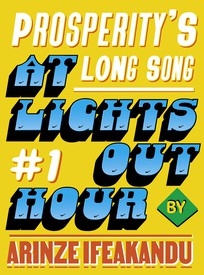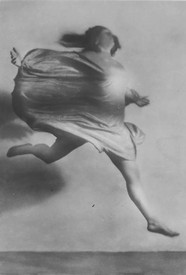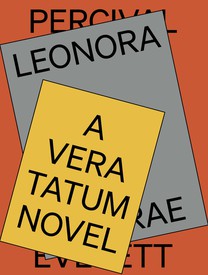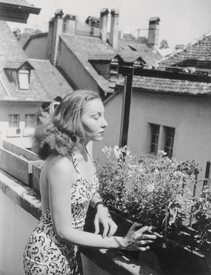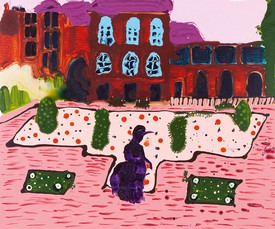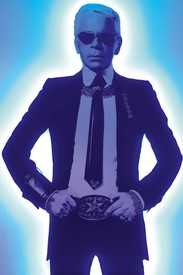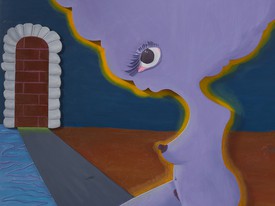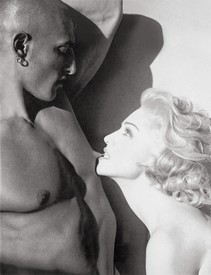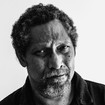
Percival Everett is the author of twenty-two novels and four collections of stories. His novels include The Trees (2021), Telephone (2020), So Much Blue (2017), and Erasure (2001). He has received awards from the Guggenheim Foundation and Creative Capital. He lives in Los Angeles, where he is distinguished professor of English at the University of Southern California.
26
As predicted, the snow started just after noon. By two o’clock it was a full-on blizzard just like before. Everyone was hunkered down in the cafeteria. Harv had taken to calling roll every three or so hours. Andy had apparently decided he needed to give Vera some space. He was busy helping the staff in the kitchen. Whether he was cooking, cleaning, or repairing appliances, Vera didn’t know. There were books and playing cards but no one wanted music. The falling snow seemed to stop time.
Melissa came and settled in a chair across the table from Vera. “I didn’t know you were in here,” she said.
“Everyone’s in here,” Vera said.
“Yes, but you weren’t before. Where’s Andy?”
“I don’t know where he is.” Vera looked at Melissa’s dry moccasins. “How are your toes?”
“They hurt. I can walk. I limp.”
“Nothing wrong with a limp,” Vera said.
“Do you know when we’re getting out of here?” Melissa asked.
“I know what you know.”
“So, just how are you?” Melissa asked.
“What do you mean?” Vera said.
“You know?”
Vera stared at her for a second. “Andy? What? That’s what you’re thinking about at a time like this?”
“I need to think about something other than what’s going on.”
Vera nodded, understanding. The woman had a point. “Sorry. He’s a nice young man.”
“I bet he’s worried about his brother.”
Vera nodded, but she really hadn’t seen that much concern. She thought perhaps it was a guy thing or a brother thing. “I feel so bad about Paula.”
“It wasn’t your fault. It wasn’t anyone’s fault,” Melissa said. “I should have known better than to go out there without proper shoes.”
“None of us were really thinking,” Vera said. “We just wanted to help. It’s hard sitting around doing nothing.”
“I’ve never been so scared in my life,” Melissa said.
Vera looked out the window.
“Andy seems very confident,” Melissa said and then fell silent.
“What?” Vera asked.
“You know what.”
“He’s half my age.”
“So?” Melissa looked around the room. “If I have to play one more hand of gin rummy I’m going to scream.”
Vera smiled. “I don’t know how to play cards.”
“So, did he sleep on the sofa and you took the bed? Details. I can tell you I wouldn’t mind that sort of attention.”
“What is this? High school?”
“Sorry.”
“I’m going to grab some coffee.” Vera left Melissa and walked over to the coffeepot near where Beverly and Harv were sitting.
“How you holding up?” Harv asked.
“Been better,” Vera said.
“I heard that,” Beverly said.
“Anything else?” Vera asked.
Harv pointed to the antique walkie-talkie. “That thing there is a piece of shit. I keep expecting it to ring or buzz or something. I wish they’d dropped us a nine-dollar phone instead, to plug into the wall.”
“I see you’ve made friends with Andy,” Beverly said.
Vera blushed a little.
“He’s special,” Beverly said.
“Very special,” Harv said.
“How long have you known him?”
“Forever, a long time,” Beverly said.
“How did you meet him?”
“That was so long ago,” Harv said. “I don’t think I can remember. Do you remember, Beverly?”
“Before he was in the Marines?” Vera asked.
“Yes,” Beverly said quickly.
“I don’t mean to pry, but I was wondering: are you two together?” Vera asked. “It seems like you are, but I don’t like to make assumptions.”
“We’ve been together for quite a while now, but we’re not together the way you mean it,” Harv said.
Vera noticed that Harv’s hand was shaking, not like he was frightened but like he was ill. “Are you okay?” she asked.
“I’m fine,” he said.
“Did you meet Andy or Opie first?”
The couple answered simultaneously but differently. Beverly said “Opie.”
“Oh, you’re right,” Harv said. “Age.”
“And probably stress,” Vera said.
“Do you think?” Beverly joked.
“Do you know where Andy is?” Vera asked.
“He’s been making periodic sweeps of the grounds,” Harv said. “I told him not to but he said it makes him feel safer.”
Vera nodded. She wanted more than anything to walk over to her cabin and be alone, really alone. She could see her door. Everyone could see it. But as she had learned, one second of looking away and everything could change. She was simply too afraid to be there by herself. And she was also, she had to admit, trepidatious about being there with Andy. She wondered if he would even consider another night in there with her.
She spent the better part of the afternoon watching the insane snowstorm and reading poetry she didn’t like or understand. She found, however, that reading the poems was far more rewarding than conversing with the surviving poets.
At dinner, Vera sat with the kitchen staff. There were three women and two men and they mainly talked about their children. Like so many New Mexicans, they shifted back and forth from Spanish to English without apparent logic. Vera enjoyed the music of it and understood most of it.
“How is dinner?” The voice came from behind her. It was Andy.
Surprised, she turned around. “Good. Join us.”
“I ate in the kitchen,” he said. “Snow stopped.”
“I saw.”
“Ready to turn in?” he asked.
Vera looked at his eyes. Her fear went away. “Yes,” she said.
They found their coats and went out the back door.
There was about a foot of snow on the ground, but it was that dry, light snow that Vera was used to. They kicked through it around the building to Vera’s cabin, stomping before entering. They took off their boots just inside. Vera was surprised to find the cabin warm, comfortably warm.
“I built the fire a while ago,” Andy said.
“Sweet,” she said, though she was slightly disturbed to know that he had been in her space without her, uninvited. “That was smart. So you knew I’d agree to come back here with you.”
“I was hoping,” he said. “If you’d said no, then the fire would simply have died out.” He smiled at her. “The way some things die out.”
“Like I said, smart. I’ll make some tea.”
“I’ll sleep on the sofa tonight,” Andy said.
“Okay.”
“I didn’t think I could stand to sleep in the cafeteria with everyone,” he said. “I didn’t think you’d want to either.”
“You were right,” Vera said.
“I was also afraid to sleep in my cabin alone,” he said.
Vera put the kettle on. “How do you think they’re going to get us off this damn mountain?”
“I guess they’ll bring up a crew and put up a makeshift bridge. That’s a guess. I don’t really know.”
“I sure hope Opie is okay.”
“He’s always okay. That’s a trait of his.” Andy sat on the sofa and looked out at the snow.
“How did you come to get this job?”
Andy shrugged. “Saw an ad. Called Harv. Here we are.”
“Just out of the blue?”
“Yep.”
Vera dropped the bags in the mugs. “Who’s taking the first watch? Or should I say, who’s going to attempt to sleep first?”
“You sleep. I’ll watch,” he said.
“Okay.” She carried the tea to the table. “I think I’ll skip the shower tonight. You understand.”
Andy nodded.
“You know, I really didn’t mean to rush things. I didn’t want to,” he said. “It’s just that . . . ”
“Let’s just have our tea.” She took a sip. “I don’t even know your last name. That’s crazy.”
“It would be funny if it was Griffith, wouldn’t it? It’s Kedi.”
“What kind of name is that?”
“My grandfather was Turkish. That grandmother was Irish. My mother’s mother was German and I don’t know about that grandfather. I’m just a mutt.”
“Aren’t we all.” Vera put more hot water in their cups. “You know, we should talk about last night.”
“Really?”
“I don’t want you to get the wrong idea,” she said. “I mean, I enjoyed it. I think I enjoyed it.”
“Wow, what guy doesn’t like to hear that?”
“That’s not what I mean. But that’s why I freaked out this morning. I guess I was so tired I fell asleep.”
Andy laughed softly. “Keeps getting better.”
“Come on, help me here.”
“I know, Vera. We were both extremely exhausted. And damn scared. Fear does crazy things to people. Fear is very powerful. Maybe the most powerful emotion we have. Do you agree with that?”
Vera nodded. “Anyway, I just wanted you to know that it wasn’t you. You’ve been great. I just got scared. Of everything.”
“Makes sense,” Andy said. “So I’m on the sofa, you’re on the bed. Once we’re off this damn mountain we’ll figure out what we’re doing. Or what we can do. Deal?”
“Deal.”
27
Vera had no plans for falling asleep. She sat at the little kitchen table. But she felt so terribly tired. Her head kept dropping and coming back. She was so sleepy, so incredibly sleepy. Andy might have actually helped her over to the bed, but she didn’t know, couldn’t be sure of anything. She knew she was falling into a deep, deep sleep, something maybe more than sleep, but she couldn’t stop.
Vera awoke to screaming, such loud screaming, many voices screaming. She sprang up from the bed, shaking. Her door was wide open and the freezing air was rushing in. Outside she could see the beams of many flashlights and still heard the screaming. She paused to slide into her boots and then she ran through the open door and joined the others. No snow fell.
“I saw it,” Tad Gibson said. “It was so fast, so big.”
A human body lay on the ground, looking like it was moving because of the shaking flashlights. But it wasn’t moving, not at all. Vera saw immediately that it was the body of Melissa Begay.
She gasped and turned away. She turned away, right into the arms of Andy. She was startled to find him.
Vera turned to look again at Melissa. She was covered with blood, her head nearly severed. People ran back into the cafeteria.
“Why was she out here?” someone asked.
Tad Gibson was shaking uncontrollably. Again he said, “I saw it. I saw it. The way it moved.”
“What did you see?” Harv asked.
“It sprang on her. I was at the window. It sprang, like a wolf or something. Maybe from up in the tree.”
“From above here?” Andy asked.
Tad shook his head. “I don’t know. Melissa was just standing there. I wondered why she was out there. It looked like she was talking. Oh my God.”
“Go get some coffee,” Beverly said. “Get some rest.”
“Andy, go with him,” Harv said.
Vera watched Andy help Tad into the cafeteria. “What now?” she asked Harv and Beverly.
“She shouldn’t have been out here,” Beverly said. “Why was she out here? This is so stupid.”
“Everybody stays in the cafeteria. Everybody,” Harv said. “Everybody stays in the damn cafeteria. You too, Vera.”
“Harv,” Vera said, “may I talk to you?”
“What?”
“When the screaming started, I jumped up and my door was wide open and Andy wasn’t with me.”
“What are you saying?”
“I don’t know,” she said. “It felt like he wasn’t in the cabin with me.”
“He probably just ran out before you got up.”
Vera recalled how cold the room was. “I don’t think so.” And she had had to pause to get on her boots. Could she have been in so deep a sleep?
“I’ll ask him to stay put like the rest of us. It seems you were right. There’s some kind of animal out there.” He looked at the sky through the trees. “It’s almost morning. That’s good.”
“What are we going to do about Melissa?” Vera asked.
“I’ll cover her. The police should be here soon. They’ll want at least one body left where it fell.”
Vera nodded.
Back in the cafeteria people huddled together, cried, cowered, either stared out the windows or looked away from them. Harv called the roll again. He stopped midway because no one was listening.
Tad Gibson was describing over and over the creature he had seen. There seemed to be more detail with each telling, but nothing became clearer.
Melissa. For some reason Vera felt responsible for Melissa’s death as well. She knew it was irrational, even untrue, but that was what she felt. She spotted Andy across the room. He was telling a couple of women that everything was going to be fine, that he would be in the cafeteria with them.
Vera sat against the wall, far from the bank of windows, but looked through them. Morning broke.
28
Before the muffins were put out, there was a sheriff’s helicopter above the yard. Harv had the walkie-talkie and was standing beside the covered body of Melissa. Two deputies were lowered by ropes and then the big machine was gone. Vera had never been so happy to see guns. Harv talked to the police and they nodded in that emotionless way in which people with guns often nod. Harv told them more and Vera moved closer. She stood between Beverly and Andy and listened.
The deputy who seemed to be in charge spoke into his radio. “Sheriff, this is Garcia up at that Kachina place. We’re going to need some more men up here. No, I mean pronto. We got us a bunch of dead people up here. They did not die of natural causes. We’ve got a scene, scenes, to process. Maybe an animal. Not clear. These folks are scared. Yes, sir. I’ll tell them. Yes, sir. Out.”
The other deputy kneeled beside Melissa and peeked under the tarp and let it quickly back down.
“So?” Harv said.
“Sheriff is going to send some more deputies. They’re trying to get an emergency bridge up here through the snow. They have a Cat plowing the road before the truck. Slow going.”
“How long?” Beverly asked.
“It will go pretty quick once they get here. Three, four hours to deploy the bridge. But getting here, that’s a different situation. The road is a real mess. I ain’t going to lie to you people.”
“Let’s get inside,” Harv said.
Given the size of the monster in her imagination, Vera didn’t like the fact that the deputies were such small men. Neither was over five eight and they were slight of build. But they did have pistols.
Everyone got situated and quiet. Harv stood up to the mic. “People, these are deputies Garcia and Bradley. They tell me that a bridge is on the way up here now.”
There was quiet cheering.
Harv turned to the deputies. “Deputy Garcia.”
“Everybody, I know you’ve had a difficult time, that you’re scared, but we’re here to protect you. We also have to start our investigation. Since the bridge isn’t here yet, it won’t slow down you getting home.”
“How long before the bridge gets here?” someone asked.
“I don’t know, ma’am. Once it’s here, they’ll call us.” Harv gave a sheet of paper to Garcia. The deputy looked at it. “Deputy Bradley and I are going to interview all of you. A through K line up over here and wait for me. L through W over by the windows and wait for Deputy Bradley to call you.”
Bradley watched as Garcia tore the page down the middle.
“You’re not just going to leave Melissa out in the yard, are you?” Vera said.
“We have to process the scene. Take photographs, blood samples, and the like. I’m sorry about your friend.”
“But she’s lying out there,” Vera said.
“What would you have me do, ma’am?” Garcia asked.
Vera got a hold of herself.
“Is more snow coming?” Fiona asked.
“No ma’am. It’s not in the forecast.”
Bradley walked over to a table by the windows.
“Okay, let’s get started,” Garcia said.
“Please be cooperative,” Harv said.
People didn’t line up, but sat wherever they wanted and waited to hear their names.
Hours went by.
“Where’s the bridge?” Vera heard Tad Gibson ask Deputy Bradley.
“Closer,” Bradley said.
Participant after participant gave their statements. The helicopter returned at noon, depositing another two deputies and the sheriff himself. He was a tall man. Instead of the ball cap worn by the deputies, he wore a cowboy hat, but it gave him an air of authority. His name was Robert Montoya. He listened to his deputies before talking to anyone else. They stood in the yard next to the body of Melissa Begay. When Harv tried to approach, Montoya stopped him with a raised palm and continued to listen to his men.
Satisfied, he signaled with an open hand for Harv to come closer. Vera was not far away. “Looks like you’ve got a mess here,” he said. “Dead people usually equal a mess. How many?”
“Seven.”
“That’s a lot of dead people. A big, big mess.” He looked at the crowd of people. “I’d like to speak to Mr. Gibson.”
“Tad,” Harv called.
Tad Gibson stepped forward.
“Please tell me exactly what you saw, Mr. Gibson. Where were you standing? Start with that.”
“I was standing in the cafeteria, looking out the window.”
“Which window?”
“That one.”
“Come on inside and show me,” Montoya said. He followed Gibson into the building. Harv, Beverly, and Andy followed. Vera trailed.
Inside, Gibson started his story again. “I was standing here and I was looking out because I saw someone. We were all supposed to be in here, so I was curious. She was standing near that white SUV. I thought she was talking to somebody.”
“Why did you think that? Could you see somebody else?”
Gibson shook his head. “It just looked like she was talking. I think she nodded. I think she smiled. And then—”
Montoya was patient. He waited. Vera was impressed by that.
“And then, then she was in the air,” Gibson said.
“In the air? How high?”
Gibson nodded. “High. Over the car.”
“Any idea how she got up in the air?”
“Then I saw it. It was so fast. It was a blur.”
“How big was it?”
“Big.”
“Big as me?”
“Jesus, I don’t know. Just real big. It sort of looked like a skinny bear, hell, I don’t know.”
Montoya took a deep breath.
“And then, just like that, she was on the ground. Someone came up behind me and screamed.”
Montoya looked at the notes Garcia had given him. “Laura Ackerman? Can I get Laura Ackerman over here?”
Beverly called Laura over.
“Okay, Miss Ackerman,” Montoya said, “tell me what you saw.”
“I saw Melissa lying in the snow.”
“Did you see how she got there?”
Ackerman shook her head. “She was just on the ground. I knew she was dead.” The woman started to cry.
“How did you know she was dead?”
“Her head was at such a strange angle.”
“Okay, you can go sit down.”
“When is the bridge getting here?” Harv asked.
Montoya looked at Harv, very businesslike and with sympathy. “Even if that bridge is set up right now, ain’t nobody going no place until I get some kind of picture of what’s gone on here.”
“These people are scared,” Harv said.
“I bet. I don’t blame them. They ought to be scared. Now take me to where the first person died.”
“That would be Tori Lockwood,” Harv said. “This way.”
Vera was no longer able to hang close to the sheriff and Harv and listen in. She sat not far from Tad Gibson by the window. He stared out at Melissa. Vera went and got some coffee and carried it to him.
“Thank you,” he said. He looked at her.
“Vera,” she said.
“Tad.”
“I know.”
“I should have gone out there,” he said. “As soon as I saw someone outside, I should have gone out there.”
Vera was about to tell him that there was nothing he could have done, but she didn’t. She just sat quietly.
“Did you know her?” Tad asked.
“We talked,” Vera said. She didn’t say that they had been together in the woods when Paula was lost. “Did the animal, that thing, you saw look like a mountain lion?”
Gibson shook his head. “To tell the truth, I thought she was you at first. Because you weren’t in here with the rest of us.”
Vera nodded. Now she felt guilty. Perhaps he would have run and maybe scared the thing away if he hadn’t thought for a second that it was her, Vera. But then he’d probably also be dead.
“This is the worst thing I’ve ever been through,” he said.
“All of us,” Vera said.
“I thought it was Jerry, I have to admit. I feel bad about that.” Then, as if he needed to find some control somewhere, he said, “You okay?”
“Yes, I’m okay,” Vera answered his ridiculous question.
“Why’d you ask if it looked like a mountain lion?” Gibson asked.
“Just wondering what kind of animal can do this.”
“One big cougar, that’s all I’ve got to say. What I saw was so fast and large.” He was trembling.
Vera looked over at Dishti nine and saw the sheriff and the deputies exiting. The men looked dazed. Even Montoya appeared shaken, his face almost white. Seeing him like that upset Vera. She watched as the men followed Harv toward the edge of the camp, toward the cabin where the bodies, the parts of bodies, were stored.
A muffin and a cup of coffee later, Sheriff Montoya was back in the cafeteria. “I’d like to speak to Miss Tatum,” he said to Harv.
Harv looked over at Vera. Vera walked over.
“Hello, Miss Tatum.”
“Vera,” she said.
“Okay, Vera. You told my deputy you were with Paula Stone when she disappeared. And Melissa Begay was with you also.”
“Yes. And Fiona, I don’t know her last name, she was with us.”
“I have that in my notes. Can you tell me what happened? Fiona’s last name is Archer.”
Vera told them how they had gone out looking for Winnie, about how it was snowing so hard, about how Paula was there and then she wasn’t. Then she told him about the sound, the low growl.
Montoya listened.
“I suppose I could have been imagining it. I can’t remember but I think the others heard it.”
“I’ll ask Miss Archer,” he said. “It’s a terrible thing.”
“Yes.”
“And last night. Where were you when Melissa Begay was killed?”
“I was in my cabin,” Vera said.
“While everyone else was here in the cafeteria?”
“Yes.”
“Why weren’t you in here?”
“I was with Andy.”
Montoya nodded. “You and Andy, you’re together?”
Vera didn’t know quite how to answer. “We’re friends.”
“You met here?”
She realized that he already knew the answer to that question. It made her nervous. “Yes.”
“Tell me about last night.”
“I heard screaming and I jumped out of bed and ran outside.”
“In your pajamas?”
“I was dressed. I was asleep in my clothes. My boots were by the door.”
“And Mr. Kedi?”
“He was awake keeping watch. He ran out before me.”
“You saw him run out?”
“No, but the door was open.”
Montoya nodded. “Fiona Archer was with you on the trail.”
“Yes,” Vera said.
Montoya looked over at Harv. “Fiona Archer.”
Vera nodded. “What could do this?”
“I don’t know, Vera.” Montoya looked at his boots. “I don’t know.” Then he collected himself. “But we’re going to find out.”
“I’m glad you’re here.”
“We’ll get you home soon.”
“Right out of central casting.” It was Andy. He had come to her from the kitchen side and startled her.
“What?”
“The sheriff,” he said. “He’s like a TV sheriff, don’t you think?”
“Seems good at his job,” Vera said.
“That’s what I mean. He’s the sheriff. The other guys are deputies. They all look their parts.”
Vera agreed. “Where have you been?”
“Helping Harv show the bodies. And worrying.”
“How did you get out of the cabin so fast?” she asked, surprising herself.
“You didn’t get up right away. In fact I walked over to you. I wanted to kiss your forehead but you were out cold. Dead to the world. Sorry, that was a really poor choice of words.”
“Did you ask the sheriff about your brother?”
“That’s why I’m worrying. He doesn’t know anything about Opie. It looks like he didn’t make it down there.”
“You don’t think,” Vera said.
“I don’t know what to think. But the sheriff said I could try to hike down and look for him. He said the crew might run into him on their way up.”
“He should have been down there a long time ago,” Vera said. “Oh, Andy, I’m so sorry.”
“I’m going to go gear up and head down now.” He looked over at Montoya. “He’s here now. I don’t care what he says. You’ll be okay, right?”
“What about you? That thing is out there.”
“Apparently it likes women,” he said.
“And maybe your brother. I’ll be fine. We’ll get together and have a drink to celebrate our survival once we’re in Santa Fe.”
Vera saw Harv staring at Andy. When Andy looked up, Harv looked away.
“I’ll see you when all of this is over,” Andy said.
“Sheriff Montoya isn’t just going to let you leave.”
“It was his idea.”
29
Vera learned from Tad Gibson that Sheriff Montoya had sent his deputies out in teams of two to look for trail signs of an animal and other evidence.
“By evidence you mean body parts,” Vera said, blankly.
“I guess,” Gibson said. “Where is your boyfriend?”
Vera didn’t have the energy to take offense or offer a correction. “He went looking for his brother.”
“With no gun? Macho man.”
“It’s getting dark,” Vera said.
“I wish it wouldn’t.”
Vera looked at the clear sky. “At least it’s not snowing.”
“So I guess you’re sleeping with us tonight, so to speak.”
Montoya came out of the cafeteria, talking on his radio. Harv and Beverly followed him close. “The bridge is here,” the sheriff said flatly. They’re going to try to get it erected over tonight but they can’t make any promises. Then I can get some trackers over here. Some hunters.”
Gunshots rang out. Montoya jumped. He turned to Harv. “Keep everybody here. Call roll. Everybody. Staff, everybody. Got it?”
“Got it,” Harv said.
Vera wanted to follow Montoya up the trail, but she had listened to him. Harv urged her into the cafeteria. He called the roll as instructed. There was no one missing. Vera was glued to the window, watching out. The yard was so desolate, so still. About thirty minutes later, in the indistinct dusk, Vera could see someone she believed to be Montoya. He dragged a man by his jacket across the snow.
“Jesus!” Vera shouted. “Harv!”
She ran to the door and out just ahead of Harv and Tad Gibson. Gibson was saying over and over, “Oh my God. Oh my God.”
“Shut up,” Vera said.
It was Deputy Bradley that Montoya had dragged. “Get him inside,” the sheriff said. He turned to face the trail.
Bradley was blood soaked, though Vera could see no place on his body where he was injured. He was in shock or in so much pain that he was unresponsive, but he was not unconscious.
Montoya got on his radio. “How far away are you? Well get back to the compound pronto. Keep your eyes open. Dixon, reach base and get some medics up here. It’s an emergency.”
“What do you want me to do?” Harv asked.
“Keep everybody inside.” He reached down and pulled a small pistol from a holster on his ankle. He handed it to Harv. “Just keep it.”
“Okay,” Harv said.
“I’ve got to go back for Garcia,” Montoya said.
“Not by yourself,” Vera said. She took the .38 revolver from the deputy’s hand.
“No,” Montoya said.
“I know how to shoot,” she said.
Montoya wasn’t going to waste time arguing with her. “Keep up,” he said. Some steps up the trail, he said, “Please don’t shoot the sheriff.”
“Did you see it?”
“I saw Bradley and the blood. He’s got a deep slash in his back.”
“Did you see your other man?” Vera asked.
“No.”
Vera was working hard to keep up with the sheriff. The pistol felt surprisingly heavy. She didn’t know where to point it as she ran. It was darker now. The light from Montoya’s flashlight bounced crazily on the trail and trees in front of them. She really hoped she wouldn’t shoot the sheriff.
“Stop,” Vera said. “Stop. Listen.” That low growl sounded somewhere off in the trees. “That’s the sound. Do you hear it?”
Montoya didn’t say anything, but she knew he was nodding.
“That’s what I heard,” she said.
“Garcia!” Montoya called out. “Goddamnit! Garcia!” He swept the ground ahead with the flashlight beam. “There.”
He had found some blood in the snow. “This could be Garcia’s or Bradley’s. I have no idea.” He moved the light again. “Fuck,” he said.
Vera could see it was a boot, a boot sticking out of the brush. They ran to it. It was only a boot. The sheriff reached down and picked it up. The weight of it caused him to look at Vera and then into the boot. He put the light on it. Vera saw it, too. There was a foot still inside it.
Vera felt as if she had screamed, but she didn’t know even that. She held the pistol up and pointed it into the forest. “Let’s go back,” she said.
But Montoya was using his light to search the area. “A lot of blood,” he said. “A fucking lot of blood.”
“Let’s go back, please.”
Montoya looked at the boot in his hand. He raked the trees with his light. “Okay, let’s head back. Lower the gun. Vera, right?”
“Yes.”
“Point the gun down. For all we know one of my deputies might come running up the trail. Okay?”
Vera let the pistol drop by her side.
“Good,” he said.
“Let’s go check on Bradley.”
Vera walked close to him.
On his radio, Montoya said, “Tell that crew I want that bridge up ASAP. And I want Foote and his dogs up here. Find him.”
30
The lights of the cafeteria looked so far away. Montoya moved in a way that kept Vera behind him all the while moving forward. The booted foot was under his arm and his pistol was held out in front of him, aimed where his flashlight beam pointed. Vera could hear her own breathing in the cold night. She thought she sounded as if she was having a bad asthma attack, but she had never suffered from asthma. The sheriff tossed the boot onto the ground by a tree and urged Vera the last thirty yards to the building. The deputies rushed out to meet them.
“Where’s Garcia?” one of them asked.
“I don’t know,” Montoya said. He looked to Harv. “How many doors does this place have?”
“This front one and the back kitchen door.”
“Aguilera, go back there and lock that door. Grab a chair and sit in front of it and stay awake.”
“Sheriff?”
“Stay awake. Okay, son?”
“Yes sir.”
Montoya turned to Vera. “Are you all right?”
Vera nodded.
“Duncan, you sit right here and watch this door. Stay alert.”
“Okay,” the deputy said. He was scared.
“Where’s Bradley?”
“He’s over by the heat,” Beverly said. “He doesn’t look good.”
“Has he said anything?”
“Nothing.”
Vera followed Montoya over to Bradley. Beverly was right. The man looked near death. He was lying on his side, his head on a rolled-up coat, his wound stuffed with a blood-soaked tablecloth, his face drained of color. He was barely conscious. Paola and another woman from the kitchen staff had taken charge of caring for him. Fiona Archer was sitting on the floor next to him.
“The wound on his back is really deep,” Paola said. “It’s on his back, so I don’t know how all this blood got on his front.”
“It’s not his blood,” Montoya said.
“What’s happened?” Harv asked.
“Is everyone here?” Montoya asked.
“Everyone, “ Harv said.
The sheriff’s radio beeped. “Yes?” he said into the device. “Good. Call me when it’s done.” He spoke to everyone around him: “The bridge will be done soon. And we’ll get these people out of here.”
That message got around the room and there was a buzz of relief and approval.
Duncan called to the sheriff, “Hey, boss?”
“Yeah?”
“If I see something?”
The sheriff looked at Harv again. “Everybody is in here?”
“Yes.”
Then to Duncan, “Shoot it.”
“Andy’s out there,” Vera said. She looked at Harv.
Harv seemed to hesitate. “She’s right.”
“Andy the handyman?”
“He went to look for his brother,” Vera said. “He told me you gave him permission.”
“He did, did he?”
“Duncan, relay that. Look before you shoot. We’ve got somebody out there.” He sighed. “That makes things messy.”
Montoya looked at Vera, reached down, and took Bradley’s pistol from her hand. “I’ll say this, you’ve got a lot of guts, ma’am. Let’s see if you can hang on to them. Don’t be so macho.”
“I wasn’t thinking,” Vera said.
Montoya smiled at her. “Thank you.” He looked out the window, then to Harv and Beverly. “I want to hear about this Andy and, what’s the brother’s name?”
“Opie,” Beverly said.
“Andy and Opie? Are you kidding me?”
They walked to the far side of the room and Vera could no longer hear them. She looked down at Fiona. “Has he said anything at all?”
Fiona shook her head. She leaned back against the wall and closed her eyes. Vera looked around at everyone in the cafeteria. They were all so tired. Perhaps too tired now to be as afraid as they ought to be.
Montoya returned to his injured deputy’s side and took Fiona’s place on the floor. Vera was touched by the way the man sat there with his hand on the head of his friend. He again spoke into his radio, telling the people at the soon-to-be bridge that he wanted the paramedics right away.
The lights went off. People screamed. Flashlights came on.
“The generator,” Vera said.
“It was fueled today,” Harv said.
“Where is it?” Montoya asked.
“I know where it is,” Vera said.
The sheriff looked at her. “Okay. My shadow.”
“I’ll show you,” Harv said.
“You keep the folks in here calm. Come on, Vera.”
Vera led the way. She was glued to Montoya’s elbow. “It went out the other night, too. That was the night Lisa was killed. I think. Everything is a blur now.”
“I’m sure.”
“That’s it.”
The sheriff looked at the big machine.
Vera grabbed his hand and pointed the light at the control box. She lifted the cover and flipped the switch. The machine thumped and came to life.
“Is this all it took to turn this back on last time?” he asked.
“Yes.”
“And you did it?”
“No. Andy did it,” she said.
“So he was with you when the lights went off last time.”
Vera thought. “Well, no, I was in the main office. I was in the little room with Jerry. Jerry’s body. Andy had gone to get a tarp.”
Montoya scanned the area with his light. “Okay, let’s get back inside. So, this Andy, you said you’re not with him.”
“That’s right.”
They went back to the cafeteria. Montoya called out as they approached, “Don’t shoot me, deputy.”
“I’ll try,” the deputy said.
Inside, the sheriff had Harv call roll again. All present. Except for Bradley. He had died.
31
Vera was head down on a table, not quite asleep, when she heard a vehicle crunching on the gravel in the yard. Everyone awoke and cheered. They had made it through another night. The sheriff instructed them to remain inside while he went out into the dark. More policemen were the first to arrive. He pointed and stationed them around the grounds. Paramedics were right behind them. They ran in and were directed to Bradley. They knelt beside him and went to work as if he were still alive. Paola was sitting on the floor some feet away, praying.
The sky showed that the world was still spinning. Things slowly came into view. Montoya ordered a bus to take everyone down the mountain but was told that it was going to be slow going. The snow and the big truck that had delivered the bridge had left the already rough road in a bad way.
A fat man with a long beard arrived with a truck full of barking dogs, all kinds of hounds, large and small.
“Foote,” Montoya greeted him. “Thank you for coming.”
“I didn’t think I was going to make it on that road,” Foote said.
“I want you to go up that trail with four of my men.” The sheriff pointed.
“What are we looking for?” Foote asked.
“Anything. Anybody. Any parts of anybody.”
“What?”
“It’s a mess up here, Foote.”
“Okay.”
Montoya pointed to some deputies and sent them with Foote and the dogs. He sent another around to the south trail.
“Harv!” the sheriff called out.
“Sheriff?”
“Let’s talk about Andy and his brother.” They stepped away and Vera was left in the cafeteria with the others. They all sat and stood around like people at an airport terminal. Somehow word had spread that Andy was of interest to the sheriff. Where was Andy? What had happened to Opie?
The paramedics had begun taking blood-pressure readings and temperatures of the participants and staff. Some really didn’t look well at all. That was understandable. Vera sat at the window, looking out, wondering if there were things she’d missed, things she should have seen, heard. She wondered if she should mention the cat dreams to anyone, then decided that all of that would just make her sound crazy. But then she probably was, she thought.
The medical examiner came and officially pronounced Deputy Bradley dead. He was then taken away by Sheriff Montoya to examine and catalogue body parts. It was all so gruesome. Vera couldn’t get the image of the foot in the boot out of her head. The idea that she had met the person who belonged to the foot scared her. Then she remembered that she had seen a head. The weight of all of it came down on her and she started to cry. A paramedic came to her and asked if she was okay.
“Are you fucking kidding me?” Vera said. “No, I’m not okay. I’ve seen a head with no body. Been chased through the woods by some monster.” She wanted to add that she might have had sex with that monster, but she didn’t. In fact, she couldn’t believe that she was thinking that.
“Breathe,” the man said.
That was good advice, she thought, so she tried it.
There was lots of coming and going of deputies and men with rifles. Though Vera didn’t see anything, she learned from Montoya that the rest of Deputy Garcia had been found. They sat on a bench just outside the cafeteria.
“The dogs found him,” the sheriff said. “You went with me to look for him so I thought you should know.”
“He’s dead?”
“Well, yeah.”
“Anything else?” she asked.
“We found a bloody skirt. A hand. Maybe a woman’s hand.”
Vera appreciated the fact that he was being straight with her. Or perhaps he wasn’t. Perhaps this was the sugar-coated version.
“If there is an animal out there, we can’t find any sign,” he said.
“What about Andy and Opie?”
“Can’t find them either.”
“You think the creature got them?”
Montoya smiled weakly. “The creature. I can’t believe you just said that and it’s not a joke. No, I don’t know if the creature got them. I do know that a person couldn’t have done what I’ve seen to these people. The medical examiner said that Garcia’s foot looked like it was ripped clean off. Not sliced off, not sawed off, not chewed, but ripped off. What could do that?”
“I don’t know.”
“There was something strange about Andy,” she said.
“Tell me.”
“I think he drugged me.”
“Why do you think that, Vera?”
“I just slept so strangely. I had these dreams.”
“Dreams?”
“I just felt like I didn’t know what was going on.”
“Did he take advantage of you?” Montoya asked.
“I don’t know,” she said. “I don’t know.”
“The bus will be here very soon and we’ll get all you folks down off this blasted mountain.”
“My car is right there.”
“We’ll get the cars down to all of you. We’re going to put you all in the middle school gym for a while. There’s a lot to process.”
“I can imagine.”
“Which one is yours?” he asked.
Vera pointed.
“Nice.”
“My husband bought it.”
“What’s he do?”
“He died six years ago.”
“Spouses will do that.” Montoya responded to a beep on his radio. The bus had arrived.
“So down we go,” Vera said.
“I’m surprised he actually got the thing up here.”
“Think he can get it down?” Vera asked.
“I guess we’ll see.”
He spoke into his radio. “Duncan, bring them back.”
“You’re giving up?” Vera asked.
The sheriff looked at the sky. “It’ll be getting dark in a few hours. I don’t want my people out there in those woods.”
Vera nodded.
“This Andy,” Montoya said. “You say there was something strange about him. Did you notice anything different about the way he interacted with Harv and Beverly?”
“Why do you ask?”
“Just asking.”
“I don’t know. Maybe I’m being paranoid, but yes, there’s something there. I noticed the way they would look at him and each other when he was around.”
“Like how?”
Vera shrugged. “Just something. What did you notice?”
Montoya didn’t hesitate. He looked Vera in the eye. “They’re scared to death of him.”
“And Opie?” Vera asked.
“I don’t know. Probably.”
The bus rolled in.
32
There was a lot of complaining about not being allowed to collect belongings, but no one was complaining about getting on the bus and getting out of there. The driver was the same man who had driven the bus to town the first night, so Vera had some faith in his ability. By the time everyone was loaded on, it was near dusk. A sturdy deputy sat directly behind the driver and Vera sat in the front row just opposite him. She didn’t want to talk to anyone. Paola and the kitchen staff sat right behind her. A tow truck with a flashing light led them out and a sheriff’s 4×4 followed behind. No one on the bus talked. A few people were fast asleep as soon as the door closed.
The bridge looked like an enormous kids’ Erector set construction. The driver obviously did not have complete faith in it, as he stopped and actually crossed himself at the precipice. There was a lot of squeaking and creaking, shaking and some screaming, as the bus inched across, but the bridge held. Vera could see the stirred-up road through the windshield as they made it to the other side. It was a muddy, deep-rutted mess. But the driver knew what he was doing.
Darkness fell before they had reached even the county road and the going became slower still. The flashing light of the leading tow truck made the trees into strange scarecrows. The rocking of the bus was hardly rhythmic and occasionally jarring, but most of the passengers were asleep or at least had retreated behind closed eyes. Vera watched the lights sweep the forest and the road in front of them. She looked across at the deputy. He hadn’t talked to her and she hadn’t looked to strike up a conversation. He was asleep now, head back, mouth open. His boots were caked with mud.
Finally they reached the county road. It was wider and without the deep ruts, but it offered some washboards. It was nine by the time they reached the highway. The tow truck pulled off to the side and let the bus pass. Vera looked back to see that the sheriff’s rig had stopped too. The sudden smooth road momentarily awakened some and the bus buzzed with chatter. The deputy remained asleep.
Ahead, a person stood on the shoulder and waved to the bus. Vera could see that it was Andy. Or Opie. Her heart jumped. The driver slowed the bus.
“No,” Vera said. “Don’t stop.”
“What? There’s room,” the driver said.
“No! Don’t stop!”
The deputy stirred.
The driver sped past the man. Vera saw the familiar face as they rolled by.
“That was Andy,” someone on the bus called out.
“Yes, it was,” from another.
“What is it?” the deputy asked.
“We passed somebody,” the driver said.
The deputy looked back through the bus at the darkness. “There’s no turning around,” he said. “Keep going.”
“It was Andy,” someone called to the deputy.
“Yeah,” from someone else. “And we just left him there.”
The deputy tried to reach Montoya on his radio but had no success. He radioed headquarters. “Please tell the sheriff to be advised that a man was spotted on the highway.” He looked ahead at the side of the road. “Possibly mile marker twenty-eight. People on the bus said it might be someone named Andy.”
“Why didn’t you let me stop for him?” the driver asked.
“I didn’t think the sheriff would want us to stop.”
“It’s cold out there,” the driver said.
The deputy looked at Vera’s face, perhaps saw her fear. “She’s right,” he said. “A patrol will pick him up.”
There was a sound on the roof of the bus.
“What was that?” the driver asked.
Several more thumps got everyone going, looking up, screaming. Many stood and moved to the center of the bus. The vehicle rocked. More screams. The deputy instinctively put his hand on his pistol. “What the hell?” he said.
It was as if rocks were falling on the roof, but there was no hillside. Something pounded on the bus.
“Deputy?” Vera said.
“I don’t know.”
The bus shook again and Vera looked back to see something come down through the ceiling, breaking through the metal and plastic as if they were cardboard. It looked like an arm, but that was a confusing thought. There appeared to be a knife at the end of it, she thought, but then she could see it was a claw. Claws. The deputy yelled for everyone to get down. The clawed end of the arm reached out, slashing Tad Gibson’s shoulder so that he spun and fell from his seat to the floor. The deputy pulled his pistol and fired into the ceiling, once, three times. More screaming. The reports of the gun made Vera’s ears ring and she could barely see because of the flashes. There was a sound like a roar, almost like a motor starting, but not mechanical. Something high-pitched, animal, not human. The bus swerved, fishtailed wildly, but the driver managed to keep the big vehicle on the road. The noise and the movement on the roof were gone. The ride leveled out and became smooth again. Some on the bus were crying.
“Are you fucking kidding me,” Tad Gibson said, holding his injured arm close to his body. “What the fuck was that?!”
“Let me see that arm,” the deputy said. “It’s not too deep.”
“The hell it isn’t!” Gibson shouted.
The deputy got on his radio. “Dispatch, get a message to Sheriff Montoya now! Tell him the bus was attacked by something. Yes, attacked. We’ve got a man that’s been hurt pretty bad.”
The deputy looked at the bus full of people. “Have the paramedics meet us at the middle school gym.”
Vera walked to the center of the bus and looked up through the hole that had been made by the arm of whatever it was. The metal of the bus’s exterior had been pushed inward. Hair or fur and blood had been left on the jagged edges.
“What the fuck was that?” the deputy said, softly, as if to himself. “What the fuck was that.”
“Should I stop?” the driver asked.
“Hell no!” the deputy shouted. “Get us to town.”
33
The deputy had been wrong about the severity of Tad Gibson’s wound. When the paramedics saw him at the middle school they decided he needed to go to the hospital. In fact he had lost enough blood that he was considerably weakened and not fully lucid.
Fiona Archer’s breathing would not slow down. She found Vera and sat beside her on a cot. “What was that?” she asked.
“I’ve never seen anything like it,” Vera said.
“It ripped through the bus, right through the metal,” Fiona said, as if narrating the events to herself would make them make sense. “It was on top of the bus and reached right through the roof.”
“I saw.”
“What could do that? A man couldn’t do that. A man couldn’t do something like that, could he?”
They found cots arranged in rows on the gymnasium floor. It looked like a scene of refugees from a hurricane. People spoke less than Vera imagined they might. The big room was quiet. They mostly sat around staring at their feet.
Vera lay back on the cot she had chosen. It was green. She was surprised to find herself nodding off. Soon she was in a deep, dreamless sleep.
When Vera awoke, she found Sheriff Montoya sitting on the cot next to her. She sat up and rubbed her eyes.
“That must have been something to see,” he said.
Vera nodded.
“Is Tad all right?”
“Mr. Gibson is okay. Now that he’s had some time to reflect, he’s pretty shaken up.” The sheriff looked past Vera and across the room. “Would you like some coffee?”
Vera looked behind her and saw a table set up with coffee and pastries. “I’ll get some tea later.”
“I need you to tell me everything you saw last night.”
Vera nodded, was silent for a few seconds while she collected herself. “I was sitting in the front of the bus across from your deputy. He had his eyes closed.” Vera didn’t want to say that the man had been asleep. “There was somebody standing on the side of the road. The driver started to slow down and it looked like Andy. Or Opie. I had no idea which one, but I told the driver to keep going. Not to stop.”
“Why did you tell him that?”
“I don’t know. I got scared.”
“Of Andy?”
“Yes.”
“Why?”
“I’m not sure.”
“So he kept driving, passed the man. Then what happened?”
“And then there was something on the roof.”
“How much did the driver slow down?”
“Not much.”
Montoya nodded for her to go on.
“There was something on the roof. It was making the whole bus shake. Everybody was screaming. A lot of people turned on overhead reading lights. And then it tore through the roof and the ceiling and started reaching around. That’s when Tad got hurt. The deputy shot his gun through the ceiling. And then it was gone. At least it was quiet.”
“You okay?”
“What do you think it was?” Vera asked. “It was a like an arm, but it had claws. I think it had claws. Maybe it was a knife. It was all happening so fast. Did your men find anything up there?”
“I think we found your friend Paula.”
She looked at him.
“Dead.”
Vera sighed. She said, more to herself than to him, in a sort of shamed way, “She wasn’t a friend.” She sat up, collected herself. “I’m sorry about your men.”
“Garcia has six kids. Had.”
“Do you believe in monsters, sheriff?” Vera asked.
“I do now, Vera.”
Vera looked across the room at a crew wiping down the tables, chairs, and door handles. “There’s something else going on,” she said.
“There’s a virus. It’s called Corona Nineteen.”
“What?”
“Apparently it’s really dangerous. They’re telling us to wash our hands a lot and to stay away from each other. It’s really bad in New York.”
“Oh no.”
“Ironically, you were probably in the safest place in the country up there. In some places, like New York and Los Angeles, they’re telling people to stay home and not go out.”
“Wow.” Vera shook her head. “This is really serious?”
“I’m afraid so.”
“It’s all over the news,” Fiona Archer said. “There’s a news crew outside right now.” She was drinking a Diet Coke from the can. Yes, it had all been awful, terrifying, but as Vera looked around the room she saw something else brewing, the kind of titillation that comes with being a part of something. Something. Truth was, Vera didn’t want to be there. She didn’t want to belong to the Survivors of Kachina. She would not be interviewed. She had decided that.
Then they learned that the news crew was not allowed inside because there was fear of infection. The virus was out there somewhere.
They were all moved to the old Rio Grande Motor Inn near the airport. News cameras and reporters were waiting there, but at a distance. They asked questions only of those who paused to take them. Police and deputies patrolled the halls and the parking lot in pairs.
Still, Vera had to tell her version of what had happened on the mountain and on the bus four or five more times. To a sheriff’s deputy for an official typed statement. To the state police. To the district attorney. There was even a uniformed man from the Air Force who everyone claimed had come over from Roswell. The Air Force man wore a surgical mask. “They say the masks won’t stop the virus,” he said, “but I don’t believe them.”
The evening television news reported that there were no cases of the virus in New Mexico. The president was on television telling everyone that it was simply a bad flu, that it would be gone in a couple of days. Vera knew immediately that the virus was something to fear. The president lied about everything. Why would he tell the truth now?
After one night in the motel, their cars started showing up in the parking lot. Vera was told that deputies and volunteers had been bussed up to drive the vehicles back down. Her keys were delivered to her by Deputy Duncan.
“So when can I leave?” she asked, standing in the doorway of her room. “I need to check on my horses.”
“Anytime you like,” Duncan said. “The sheriff asked me to tell you to be careful.”
“Thank you, deputy.”
“Ma’am?”
“Yes?”
“Did you see the thing?”
“No,” she said. “I’m sorry.”
“I ain’t never seen anything like what I saw on that mountain.”
Vera said nothing, listened.
“I don’t see how any of you are still standing.”
Vera knew it was no feat of strength, emotional or otherwise, that had any one of them “still standing,” as he put it. She looked at the very young man. “You’re still standing. That’s all we can do, isn’t it?”
Duncan looked back into the parking lot. “I like your Bronco.”
“Thanks, me too.”
“Your belongings are in your bag. I just tossed them in without looking. I didn’t fold nothing.”
Vera couldn’t tell whether he was offering an apology or assurance that he had not spent some time with her unmentionables.
“Thank you, deputy.”
The young man turned and walked away toward the office. Vera planned to leave right away. She had no desire to say goodbye or even acknowledge anyone who had been up there with her. It was still early morning and if she left now she would be back at her place well before noon.
Then she thought of Harv and Beverly. Where were they? Then she recalled that they had not been on the bus. She thought for a second that she might have liked to say something to Paola, but she had no idea where she was.
She stepped back into her room. She opened her bag to take a look. As reported, things had been haphazardly thrown in, but that was fine. She was unsure why she was even looking.
She had taken a long shower the night before and now she exchanged her dirty clothes for clean ones. She put on sneakers and walked out to her car. She tossed her bag and boots into the back and fell in behind the wheel. She made a point of not looking back at the two-leveled wall of doors of the motel. She turned the key, wondered whether the starter was going to be fussy again. The engine turned over and she breathed, perhaps for the first time since she had arrived at Kachina. She put the Bronco in gear, released the clutch, and rolled out of there.
34
Vera was pleased to discover that the pass was clear and not thick with traffic, as it sometimes was. She enjoyed the view of the Rio Grande on her right and felt some tension leave her. She stopped at the viewpoint just before the road straightened and fell down onto the Taos Plateau. She could never quite believe the beauty of the plateau from that height, the sight of the Rio Grande Gorge coursing through it like a jagged seam. She sat on the hood of her car and let the engine’s heat warm her. She couldn’t see it from where she was, but when she was on the other side of Taos she would be able to look up and see the sunlight bouncing off the metal roof of her barn halfway up her mountain. Others lived on the mountain and she had no problem with them calling it their mountain, but she did think of it as hers. She felt her breathing settling into a more familiar rhythm, not yet normal but better.
As she rolled into Taos, she realized that she had not had a proper meal in many days. For some reason, right at that moment, she also wondered if she would be attending a funeral for Lisa. She realized that she had known nothing about the woman’s life, her family, her loved ones. So it was a sullen, confused Vera who sat to eat at what had been her favorite restaurant in Taos, Ernesto’s.
Ernesto was a woman. Her name was actually Theresa-Maria, but she thought a man’s name would lure more tourists. Perhaps she was correct, Vera thought: her place was always crowded while Zelda’s on the other side of the Plaza was not. This might have been explained by the fact that Zelda was a terrible cook, but no one wanted to come out and say that.
Theresa-Maria came out to Vera’s table to say hello. “What are you doing down here?” she asked.
“Just driving home from Santa Fe.”
“Santa Fe—did you hear about what went on down there? Some crazy killed a bunch of people.”
“I read about it in the paper,” Vera lied.
“I saw it on the television. They say he shot seven people. Too many guns in this country.”
Vera wondered if they were talking about the same atrocity.
“A bunch of poets getting shot up like that. It’s crazy out there. That’s why I never leave Taos. You should never leave Taos neither.”
“I’m sure you’re right, Theresa-Maria.”
“And now there’s the virus,” the little woman said. “I don’t believe it. You know they’re closing all of the restaurants in New York City. Can you imagine that?”
“I can’t.”
“All of them. Anyway, the president said it will be gone in a few weeks.”
Vera nodded.
“Are you okay?” Theresa-Maria asked.
“Just tired.”
“Have a sopapilla with honey. That will fix you up.”
Vera stopped at the Smith’s grocery market for supplies. It was a chain store that she didn’t much like, but she could always get in and out faster than at the natural-foods store where she often shopped. She drove out of Taos and through Arroyo Hondo and up the six miles of dirt road to her place in record time, she thought. No snow remained on the roads, though the muddy spots had dried bumpy.
The dogs were running to the car before she could park. She got out and fairly ignored them as her husband had suggested so many years back. She went to the back and grabbed her bag, set it on the ground. The dogs calmed down and then she greeted them. Even now she wanted to make a fuss over them as she saw them, but they always behaved better when she followed the routine. Routine was key. She would fall back into her routine and life would return to normal.
“Hey!” It was Miguel. He was coming up from the pasture.
“It’s good to see you,” she said.
“It’s better to see you,” Miguel said. “I saw the news about what happened. Was that where you were?”
“I’m afraid so,” she said. “But I’m all right.”
“Thank God.” He crossed himself. “I was down there fixing the trough. Your horses are the most destructive creatures I have ever met. But they didn’t break the water. A bear did it.”
“No.”
“I saw him. Big dude. Real big. I didn’t get a really good look. Broke into your garbage can first night, so I strapped the lid to the handles. He didn’t like that, so he folded up the sides of the lid. I crisscrossed the straps, so he threw it down the hill and crashed it open. So now it’s strapped and tied to the tree. He’s a big one.”
“Black bear?”
“I mean, that’s what we have down here, right? But he was really big. So I’m not sure. Scared the hell out of the horses.”
“Okay.”
“Be on the lookout. Maybe you still have a hungry bear around here.”
Vera nodded.
“So who killed who?” Miguel asked.
“I didn’t see anything,” she said. “It happened on the other side of the camp.”
She knew that Miguel knew she was lying, but he was never one to press or pry.
“Are you okay, Vera?”
“Yes, Miguel. Any problems here? Other than the bear.”
“Just the bear.”
“Well, they’ve been here before,” Vera said. “They always move on.”
Miguel reached for Vera’s bag.
“I’ve got that,” she said. “How’s your mother?”
“She’s fine, thank you. Ninety-three next week.”
“Wow. Good genes.”
“With luck maybe I will live so long,” Miguel said.
“You and me both.”
“If the virus doesn’t get us.”
“It’s like a science fiction movie,” Vera said. “New York sounds horrible.”
“Let’s hope it stays there and doesn’t come here. All I know is they’re telling us to wash everything. For me, I think that’s always a good idea.”
Vera seldom turned on the heat in her house, but she did as she walked in. She wanted to be comfortable and relaxed as soon as possible. Miguel had set a fire to be lit in the stove; she was thankful. Her ranch hand often thought of little things like that. Because she had no cell service at her house she still used a landline and still had an old-fashioned answering machine. There were messages.
The first was from the horse vet. He would come to give shots a week later than scheduled. The second was from Marvin the woodman. He would be delivering a cord of piñon and pecan wood and wanted to know if it should go in the usual place. The third was from Sheriff Montoya.
“Mrs. Tatum, Vera, I was hoping to speak to you before you left Santa Fe. If you could give me a call, I would appreciate it.” He left a number before signing off.
Vera did not call back right away and she wasn’t sure why. She went to the kitchen and made a cup of tea. She sat and looked out at the horses in the pasture.
35
After a longish walk with the dogs, Vera went to visit with the horses.
She ripped out some of the bright green alfalfa that grew along the outside of the pasture and fed it to them. When Vera had first arrived there had been a resident pony that was famous for escaping the pasture and eating all the super rich grass he could eat. The result was that he foundered and had disgusting-looking curled-up hooves that he could barely walk on. He was a sad sight, but no one had the heart to put him down. Finally his feet were unfixable and so painful for him that he couldn’t walk to more grass, and Vera made the decision to kill him. It was a powerful object lesson, she thought.
Vera didn’t have to wait long for the sheriff to make his way to the phone. She could hear the bustle of the office and thought it sounded old-fashioned.
“Vera?”
“Sheriff.”
“I was hoping to talk to you one more time.”
“I just had to get out of there,” Vera said.
“Of course, I understand. I would, too. I’m not complaining. But there are some other things now.”
“Like what?”
“Did you ever see Andy with his brother?”
Vera thought back. “No.”
“Apparently neither did anyone else,” the sheriff said.
“What are you saying?”
“We can’t find any record of an Andy or an Opie. Not even a person with that last name.”
“Kedi,” Vera said. “Andy told me his last name was Kedi. He said it’s Turkish.”
“He told a few other people that, too. But there’s no Andy, Andrew, Opie Kedi or anything like that anywhere. No work documents, no police records, no military records. Nothing at all.”
“Harv and Beverly must know them. They hired them.”
Montoya was silent for a few seconds. “Well, you see, that’s just the thing. Harvey Tallis and Beverly Kirby were found dead in their motel rooms this afternoon.”
Vera’s heart stopped. “What?”
“A housekeeper found them early this afternoon.”
“Like the others?” Vera asked.
“Poisoned.”
“I can’t believe that.”
“Maybe suicide. We won’t know until the toxicology reports come back.”
“I can’t believe that.”
“I know. It’s crazy.”
“Why’d you ask if I’d ever seen Opie and Andy together?” Vera was shaking. She had to put down her mug of tea.
“Fingerprints seem to suggest that there’s only one person.”
“They’re identical twins.”
“Forensics tells me that even identical twins don’t have the same prints. So either it’s one person or one of them never touched anything.”
“But what does this mean?”
“I wish I could tell you. Vera, can you think of anything at all that you remember about Andy or Opie? Anything strange, different. Did they tell you where they were from, where they lived? Anything?”
Vera said nothing.
“Vera?”
“Andy said he was in the Marines.”
“He wasn’t.”
“There’s something I should tell you. It’s not about either of them, but there was something. It started the first night.” She stopped.
“Go on,” Montoya said.
“I had weird dreams, that’s all.”
“Tell me.”
“I felt like there was a big cat in my room.” She came right out with it.
Montoya was silent.
“See, you think I’m crazy.”
“I don’t. Go on.”
“I felt like a cougar or some other kind of animal, but I think it was a cat, passed through my body.”
“How did you know it was a cat?”
“I don’t know. It felt like a cat. Listen, I shouldn’t have mentioned this. Forget I said anything.”
“Vera, wild things went on up on that mountain. Things I never imagined. I’ve got a medical examiner down here who keeps referring to the meat puzzles on his tables. All of this is strange.”
“I’m going to go now,” she said.
“Okay, Vera. If you think of anything else you want to tell me, call. You have my number.”
“Okay, sheriff.”
“Roberto. But they call me Robbie.”
“All right, Robbie.”
That night Vera was pleased to bathe in her own shower, with her own familiar shampoos and conditioners and soaps. She brushed her teeth and lay in bed with a novel that she had started long ago, but put away. It turned out to be slightly spooky so she put it down. She fell asleep quickly.
She awoke with a start either having felt a cat or believing that she had felt a cat. What was the difference, she wondered.
Part III of IV
Read “A Vera Tatum Novel By Leonora McCrae by: Part 1,” “A Vera Tatum Novel by Leonora McCrae by: Part 2,” and “A Vera Tatum Novel by Leonora McCrae by: Part 4”
Text © Percival Everett
